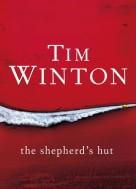Before he flees to the Western Australian desert, 15-year-old Jaxie Clackton has had the tripe thumped out of him regularly by his violent father, ‘the Captain’. He’s also watched his mother Shirley die of a painful illness and prayed (despite his atheism) for relief she never receives.
As his father drinks homebrew and rum outside after the funeral, Jaxie realises nothing at home will ever be good again.
When he finds his father dead, he knows he’ll be the prime suspect, so he bolts from the town—on foot. He’s a working class boy, the son of a butcher, who’s carrying a knife that’s useless for hunting and no gun. It is parched and lonely country. How will he survive?
‘You’re no better than your father,’ Shirley once said to Jaxie, and it’s a shocking admission considering she’s been beaten mercilessly by her husband and seen her only son pulped pitilessly too. She’s also endured the town (and its crooked cop) making light of the beatings. Turning a blind eye.
Her derisive comment about her son raises the question: Will the ‘sins of the fathers’ be visited on Jaxie? Or will he escape the weight of his father’s legacy? What are the odds?
Jaxie’s definitely hoping for more from life than his parents did but he believes his success hinges on reaching Lee. She’s the underage cousin he’s fallen in love with—the only person who really understands him—and she lives in the somewhat obviously (though also rather aptly) named town of Magnet in WA’s inland north.
Author Tim Winton lives in Western Australia and often heads into its sparse hinterlands – so his descriptions of the landscape in The Shepherd’s Hut ring true. He’s also a Christian and an ecological campaigner, who has published 29 books for adults and children, which means he’s experienced at setting a plot in motion.
After days of desert slog and extreme thirst, Jaxie eventually reaches an abandoned hunter’s hut, which has tank water. Bliss! And, you know, I’m pleased for him in a vague sort of way, sure. I mean nobody wants the underdog to die of dehydration in the desert, do they? Surely not. Anyway, I have to admit that at this point I’m really struggling (just as Jaxie is) to press on. You know, I’m thinking: Not another Winton book about a bloke going into the desert on a quest. Sigh. Also: This one uses vernacular that could strip paint. Erg.
And yet for some strange reason, as Jaxie tramps away from the hunter’s hut, I fall into step with him. Still, with each footprint in the dust, I’m wondering why.
Then it happens. Finally. The juice kicks in, and it runs like nectar. From the moment Jaxie and the priest, Fintan MacGillis, meet outside the Shepherd’s Hut, a powerful narrative force takes hold and it sweeps me along.
Fintan’s almost arcane language, his deafness and his Irish openness are the perfect foil to Jaxie’s Aussie-boy defensiveness and volatility, his rank and muscular slang.
There’s a collision of the old world and the new, the older generation and the younger, and two very different versions of maleness. They’re both exiles, holed up together in a hut that Fintan’s been living alone in for years—visited only at Christmas and Easter by a church emissary who delivers his food.
Fintan’s patient with the boy, and feeds and clothes him. Shows him kindness. He’s a good father, a good shepherd—if only Jaxie can accept it and learn to trust it (though it isn’t easy given Jaxie’s previous male role model—and the reputation in Australia of the priesthood for sexual abuse).
Some marvellously dextrous dialogue ensues, which touches on the place of forgiveness and absolution. It shows clearly why someone like Jaxie might not see the need for faith or be able to stomach the god botherers, but why someone like Fintan does or did—although not without some serious doubts.
This section has an almost biblical feel—and a tinge of Shakespeare—and it’s brilliant. The rocks grow large and walk from beside the salt lake to Fintan’s hut to appear to him vividly in a dream. The old priest is convinced these rock-people are pure and dispassionate—and he’s desperate to confess to them.
When he tells Jaxie about the apparition and his need for confession, it’s a bit like a homily. The sort that hints at humanity’s deepest yearnings while signalling the damage we’ve done to the environment and First Peoples of this country. The ‘good shepherd’ Fintan wonders: Will the birds and stones we share this ancient place with rise up and be our final judges?
As the final scenes of this brutal and intensely satisfying story play out, another quip made by Jaxie’s mother comes back to hit me with full force: ‘Five minutes of mercy in this country and you’ve got a miracle on your hands.’
Winton offers more than that.
The Shepherd’s Hut
Tim Winton
Penguin Random House
HB $39.99
Note: This review was first published in TMA, May 2018




Recent Comments